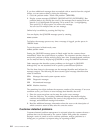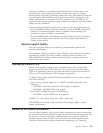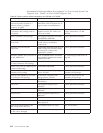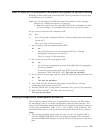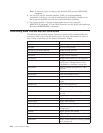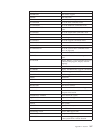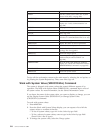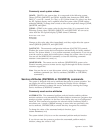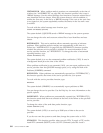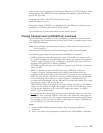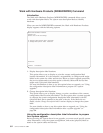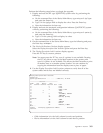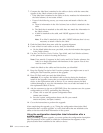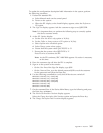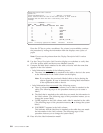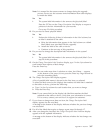CRITMSGUSR: When problem analysis routines run automatically at the time of
a failure (see “ANZPRBAUTO” on page 299), this function specifies who is sent a
*BREAK message. Use the critical message user function to create an ordered list of
user identifiers and user classes. When the system detects a critical condition, it
notifies the first entry in the list by a *BREAK message. If the user or the user class
is not signed on, the system sequentially notifies the entries in the list until a user
is notified.
To work with the critical message user function, type:
CHGSRVA CRITMSGUSR(*QSYSOPR)
The system default (*QSYSOPR) sends a *BREAK message to the system operator.
You can change the value and create an ordered list of user identifiers and user
classes.
RPTPRBAUTO: This service attribute allows automatic reporting of software
problems. When problem analysis routines run automatically at the time of a
failure (see “ANZPRBAUTO” on page 299), the RPTPRBAUTO function specifies
whether the software service provider is notified. For more information on the
service provider function, see “RPTSRVPVD”. To change the value of automated
reporting function, type:
CHGSRVA RPTPRBAUTO(*YES)
The system default is to run the automated problem notification (*YES). It runs in
a background batch job at the time of the failure.
When problem notification is not automatic (*NO), you can report problems to the
service provider from the QSYSOPR message queue, or by using the Work with
Problems (WRKPRB) command.
RPTSRVPVD: When problems are automatically reported (see “RPTPRBAUTO”),
this function specifies the name of the service provider for your system.
To work with the service providers function, type:
WRKSRVPVD
The system default (*IBMSRV) is to automatically report problems to IBM.
You can change the service provider. Use the Help key for more information on the
specific options.
SNDDTAPKT: When problems are automatically reported (see “RPTPRBAUTO”),
this function sends data that was collected at the time of the failure to the specified
service provider.
To change the value of the send data packet function, type:
CHGSRVA SNDDTAPKT(*YES)
The system default (*YES) is to send up to 2000 bytes of data to the service
provider.
If you do not want the system to send data, change the system value to *NO.
PTFINSTYP: This function specifies when to apply PTFs. To apply a PTF, use the
install PTF command (INSPTF) or the GO PTF command (select the Install a
300 Service Functions V5R2



